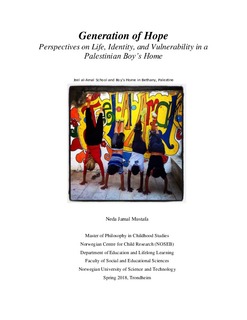| dc.description.abstract | In a political conflict and ongoing occupation such as the one that exists in Palestine and Israel, one may make the argument that all aspects of life are affected. As childhood is thought of as a social construct, the goal of this thesis is to identify unique and contributing factors that shape the lives of children who grow up in an institution away from their biological families in this context. To this effect, aspects of the immediate micro contexts, such as the home and school, were identified and discussed in connection with specific children’s rights including their right to life, education, protection, and agency. The participant’s perspectives on their wellbeing, safety, and future opportunities were used in deliberation of their perceived and evaluated cognitive and social development. This developmental process takes place on a daily basis, and was displayed by the youth in frequent caring behaviors replicated from their immediate environment such as sharing, loving, respecting and protecting others around them. However, especially in an ongoing conflict, wider macro contexts also play a significant role in the development of youth. The societal beliefs, generational memory, historical narrative in educational textbooks, religious traditions, and a sense of belonging to a place and people contribute to an understanding of oneself as part of a social group, in this case – Palestinians. Through this identification of oneself as part of a group, the collected data suggested that the participants, although considered children, had active opinions and awareness on the social and political life surrounding them. By identifying as Palestinian, a common national struggle was acknowledged that built resilient attributes in the participants as well as coping mechanisms like constructing normality that helps navigate their understanding of life. Combining the influences of the micro and macro contexts present in Palestine then revealed an interesting finding that the youth growing up away from their biological families in an institution were arguably better provided for in terms of necessities and education and more protected than children in the rest of the country, especially those who live in refugee camps. This contributed to the conceptualization of the youths’ perceived vulnerability and of adults’ perception of children’s vulnerability in this specific context. As compared to statistics of Palestinian youth arrests, injuries and murders that are directly linked to the occupation, it was found that the youth in the institution were less vulnerable and provided with more opportunities even though they do not live with their biological families. This interesting aspect counters the traditional western notion that the family home is the best place for a child. | nb_NO |
